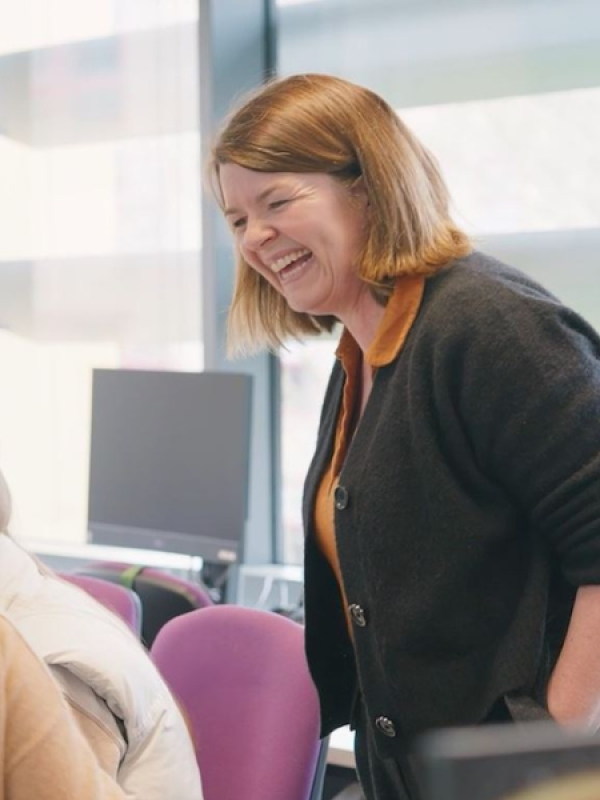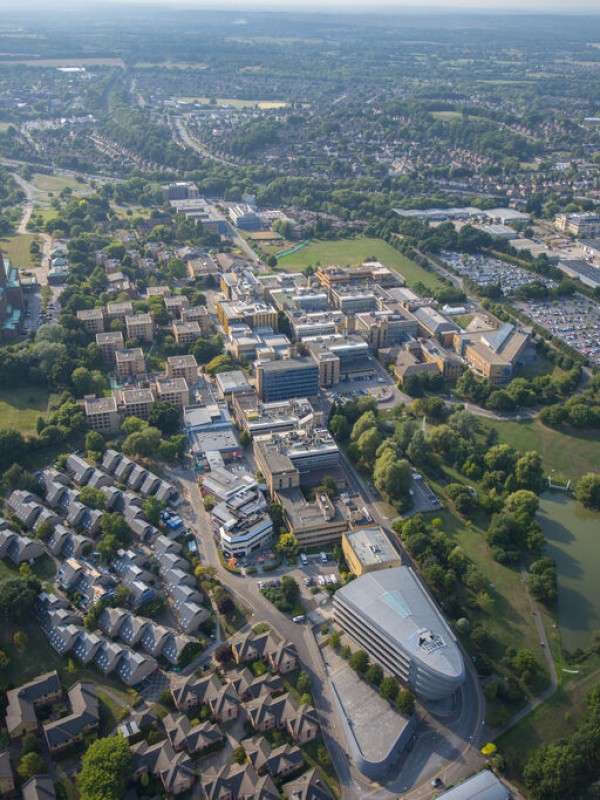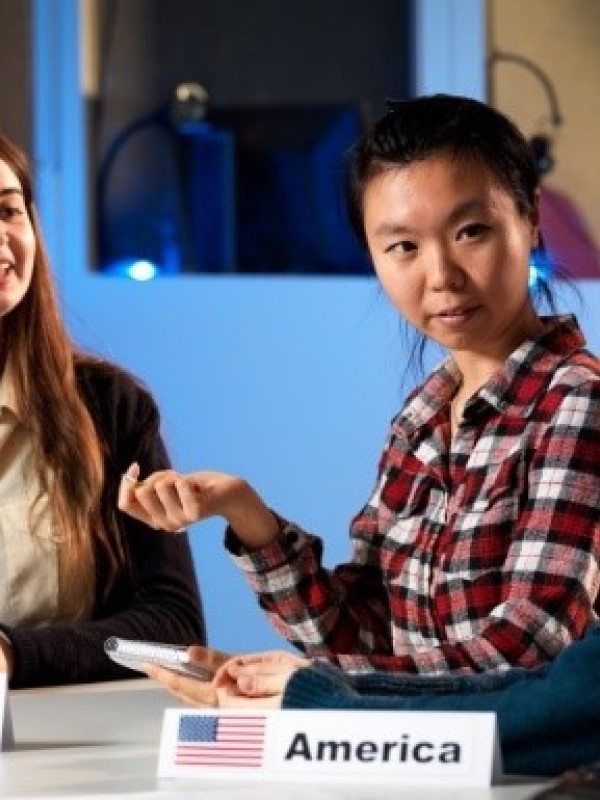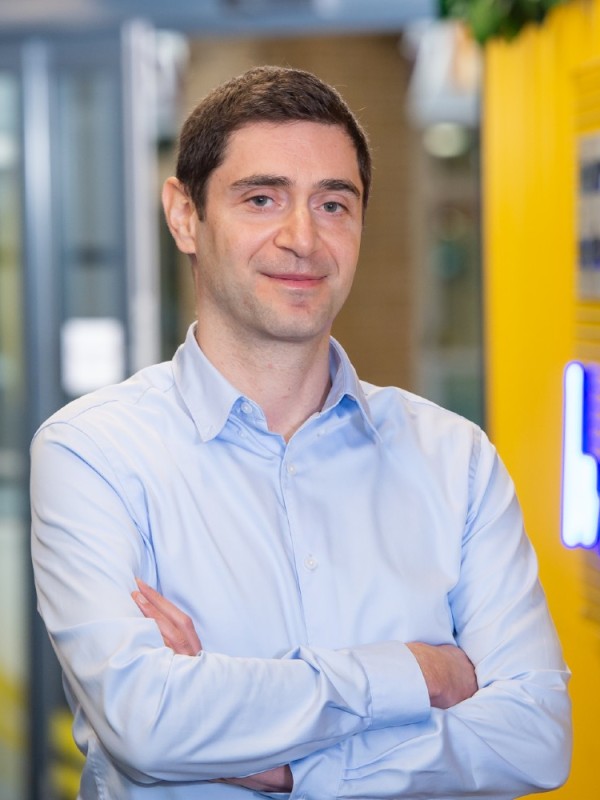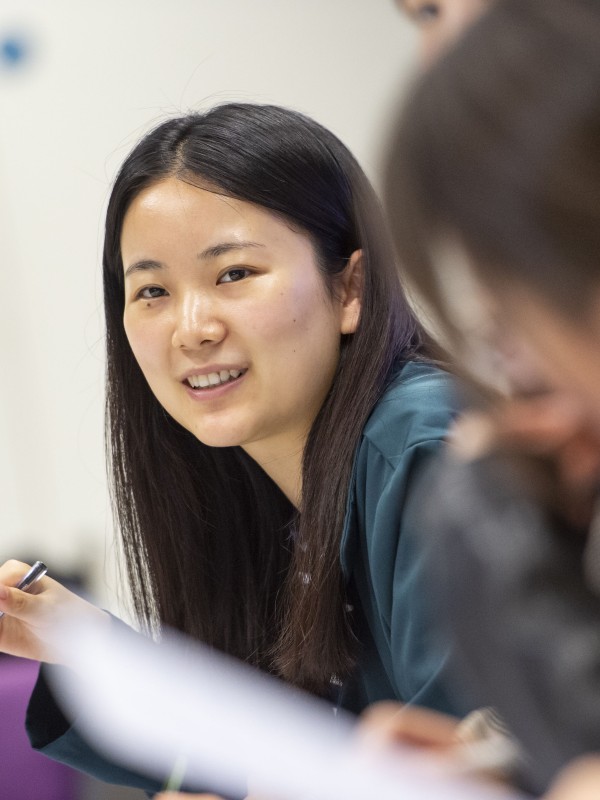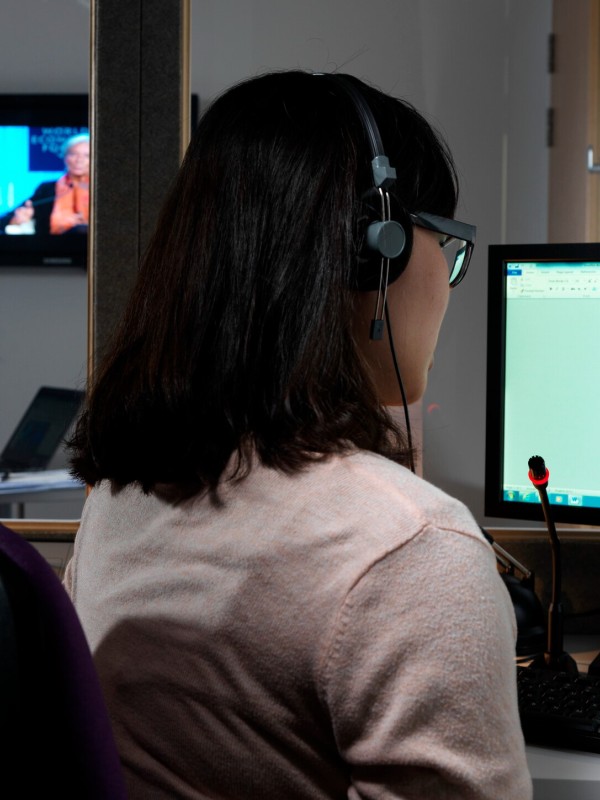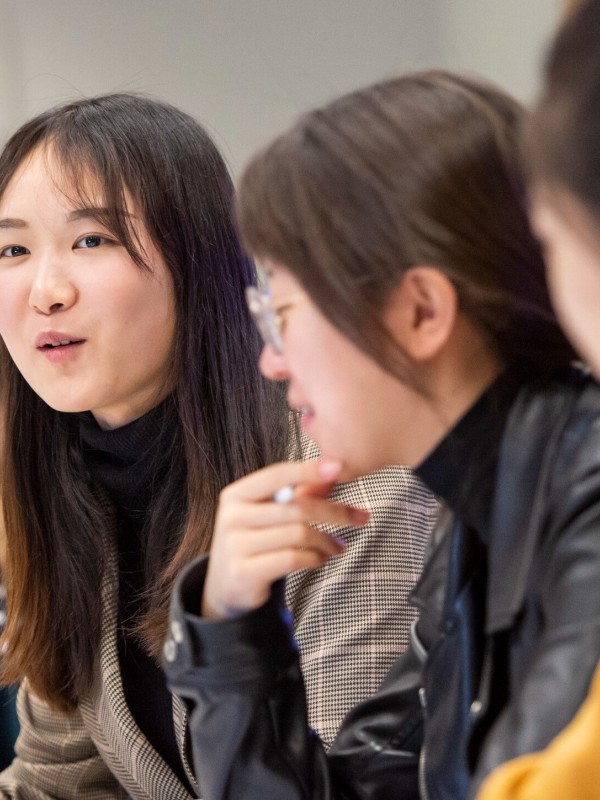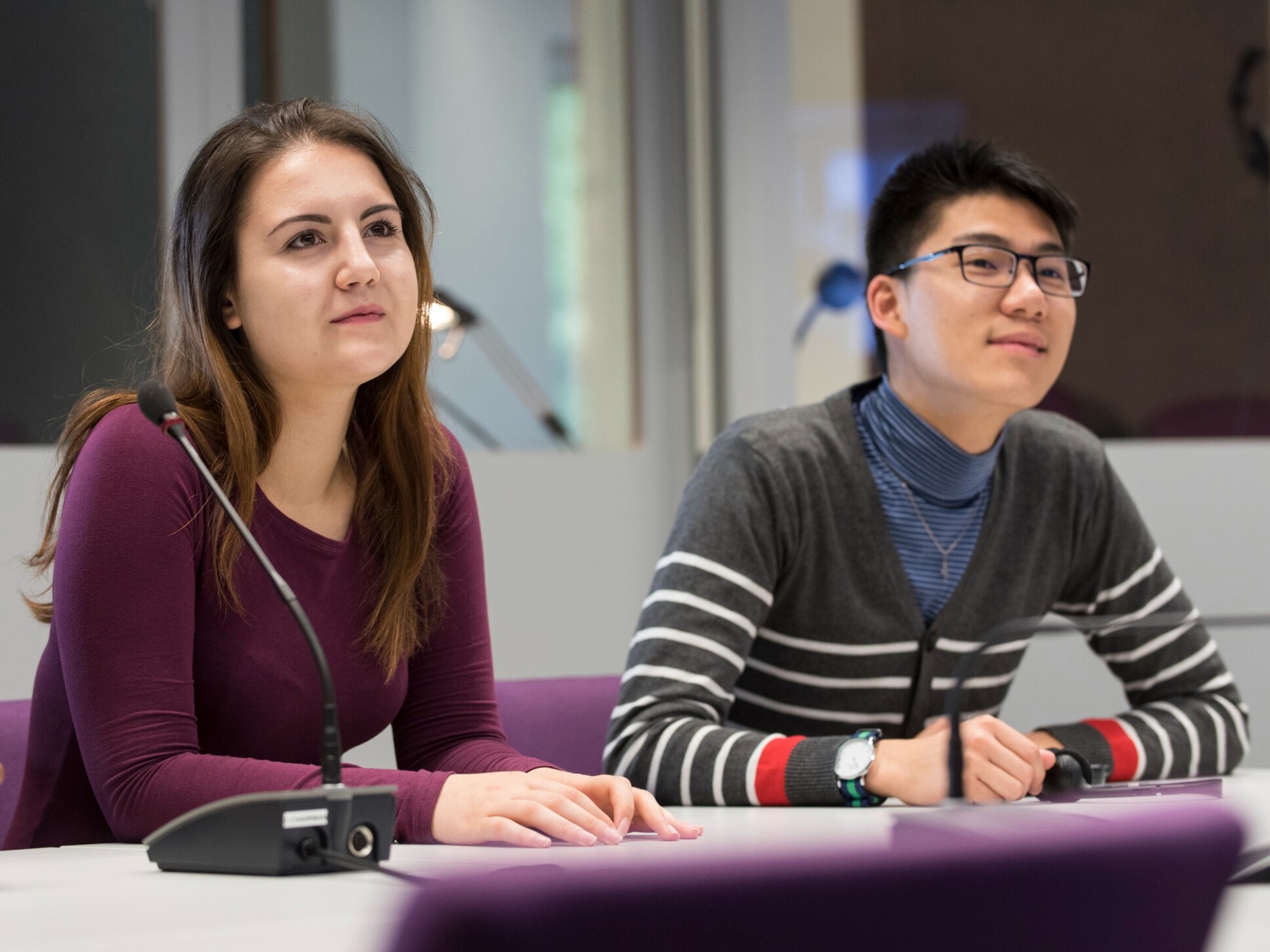
- Translation, Interpreting and AI
MA — 2026 entry Translation, Interpreting and AI
Our trailblazing course stands out as one of the few in the UK that integrate skills in both translation and interpreting with the use of cutting-edge AI and innovative language and communication technologies. You will learn how to navigate the complex linguistic, social and technological dimensions of the language services industry, significantly boosting your employability.
4,138+ people have created a bespoke digital prospectus
Why choose
this course?
- Surrey’s Centre for Translation Studies (CTS) is one of the UK’s top translation and interpreting research centres, with more than four decades of experience in postgraduate education and research training.
- Our course has a strong practical component and explores exciting and newly developing areas of the discipline, from translation process research and translation as intercultural mediation to audio/video-mediated distance/remote interpreting, hybrid modalities of interpreting, audiovisual translation, and AI.
- As a UK centre of excellence in translation and interpreting, supported by the Surrey Institute for People-Centred AI, our teaching is guided by our leading research on integrating tried-and-tested translation and interpreting practices with AI-driven technologies such as neural machine translation, speech technologies and generative AI (e.g., ChatGPT).
- We support internships and professional development activities, which will enable you to collaborate with language service providers and build a professional engagement portfolio that you can present to future employers.
Statistics
100%
Of our literature and languages graduates go on to employment or further study within 15 months of graduating (Graduate Outcomes Survey 2025, HESA)
10th for research impact
Literature and languages is ranked 10th for research impact in the Research Excellence Framework (REF) 2021
What you will study
Our internationally recognised MA combines skills training in translation and interpreting with a strong focus on developing innovative technological skills, especially the use of AI in the context of translation and interpreting. This allows you to meet global market demands and prepares you for a future in which AI advances rapidly and where specialised skills, such as leveraging generative AI and using different modes of translation and interpreting, will be essential.
We regularly offer translation and interpreting practice in English paired with other languages. We regularly offer Arabic, Chinese (Mandarin), French, German, Greek, Italian, Korean, Norwegian, Polish, Portuguese, Romanian, Russian, Spanish, Swedish and Turkish. Many other languages are available upon request, subject to a minimum number of students.
You will develop professional translation skills to produce contextually accurate, culturally appropriate, and stylistically consistent translations. Alongside this, you will gain professional skills in interpreting, including consecutive and dialogue interpreting, and sight translation, and you will practise both on-site interpreting and remote interpreting via audio/video link. You will also learn to understand, discuss and justify translation and interpreting-related decisions.
Optional modules focusing on the creative, business, technological and research dimensions of translation and interpreting enable you to customise your learning according to your own strengths, personal interests and career ambitions. You will also have opportunities to gain industry experience through work placements.
- Our flexible dissertation options enable you to choose from :A research-based dissertation on a specific translation or interpreting topic
- An extended translation or interpreting project accompanied by a reflective analytical commentary
- A critical report based on a language-industry work placement or a skills-enhancement activity (such as a summer school or similar).
During the course, academic and professional excellence will be rewarded with the following prizes:
- RWS Campus Top Student Award (two Trados Studio licenses)
- Project management training (one free-of-charge place in the Pro PM Training and Certification Programme)
- Professional Engagement Portfolio Prize
- Best Dissertation in Translation and Interpreting Prize.
An international community
Our course attracts students from all over the world, fostering a vibrant, multilingual and multicultural international community. Our MA cohorts blend recent graduates and more mature students, with diverse backgrounds and experience.
A future-proof education
The MA Translation, Interpreting and AI equips you with core translation, interpreting and technological skills, alongside expertise in terminology management for translation and interpreting, note-taking for consecutive interpreting, transcreation, localisation, multimodal and audiovisual translation, audio/video-mediated remote/distance interpreting, hybrid translation practices and other specialised and multilingual language services.
Industry-focused and informed by CTS’s leading research, our course trains you in both translating and interpreting to the highest professional standards while effectively using translation-memory systems, automatic speech recognition (ASR), neural machine translation (NMT) and large language models (LLMs), performing post-editing tasks, and collaborating through digital platforms. You will explore the quality, uses and usability of AI-powered machine translation, the translation of audiovisual content for diverse audiences, and gain an introduction to natural language processing (NLP). You will also explore corpus linguistics techniques for terminology extraction and bilingual term compilation, and learn how to enhance translation quality and adapt translation products to different user preferences through advanced writing and editing techniques.
Our experienced academic staff will guide you through current and future industry challenges, while our professional translators and interpreters bring first-hand knowledge, industry standards, and up-to-date market insights directly into the classroom.
Professional development
Our course equips you with the translation, technological, business, interpersonal and essential soft skills for a successful career in the language services industry.
You will practise translation and interpreting in your working language combination(s) through simulations of real-world scenarios across a range of specialisms (e.g., business, legal, scientific, technical and medical domains). With strong expertise in translation and interpreting technologies, our graduates are well prepared to succeed in today’s translation, interpreting and technology markets, adapt to evolving language services, and meet future market needs.
Through regular seminars with guest speakers (translators, interpreters, users of language services and researchers), you will gain further insights into the profession and the latest translation research. Our annual CTS careers fair connects our MA students with local and international language service and technology providers, supporting professional networking, while work placements provide first-hand industry experience.
You will receive guidance on developing a professional engagement portfolio to help you build a professional CV as you study. This includes documenting your collaborations with language services providers (such as work placements and volunteer translation) and other extra-curricular activities (such as mastering a new AI or translation tool, joining a professional association or attending a professional development workshop).
You will also have invaluable opportunities to further hone your translation and interpreting skills and strategies in real-life working environments. Our students have provided interpreting services for various multilingual events held at the University of Surrey, from workshops to graduation ceremonies. They have also refined their skills by participating in a remote interpreting summer school and have developed projects with the local community, such as Surrey’s Watts Gallery or the Guildford Walking Tours.
Industry links
We have forged close links with the main professional bodies in the language industry. For example, we are part of the prestigious Higher Education Partnership of the Chartered Institute of Linguists (CIOL) and a corporate member of the Institute of Translation and Interpreting (ITI). You can join these bodies as a student member during the course and become a full member after you graduate.
After graduating from our MA Translation, Interpreting and AI course, you will be able to have your interpreting modules recognised towards application for membership of the National Register of Public Service Interpreters.
We also collaborate with the Translation Automation User Society (TAUS), the European Language Industry Association (ELIA), and the Globalization and Localization Association (GALA), which enables you to apply for a work placement with various translation and interpreting partner companies. We have close links with many language service providers, and have an extensive network of visiting professionals, so you will benefit from excellent connections and be taught to industry standards.
The MA Translation, Interpreting and AI course is studied over one year (full-time) or two years (part-time). The taught part of the programme is divided into eight 15-credit modules. A 15-credit module is indicative of 150 hours of learning. The hours of learning comprise of contact hours, guided learning and private study.
The course has five compulsory modules, and you must select another three optional modules. Our varied offer of optional modules will enable you to tailor the programme to your personal strengths and preferences. You will complete your degree with a dissertation, to be submitted at the beginning of September.
The structure of our programmes follows clear educational aims that are tailored to each programme. These are all outlined in the programme specifications which include further details such as the learning outcomes:
Modules
Modules listed are indicative, reflecting the information available at the time of publication. Modules are subject to teaching availability, student demand and/or class size caps.
The University operates a credit framework for all taught programmes based on a 15-credit tariff, meaning all modules are comprised of multiples of 15 credits.
Course options
Year 1
Semester 1
Compulsory
This module provides students with little or no previous experience of interpreting with a hands-on introduction to interpreting and with the practical skills and knowledge required to perform consecutive interpreting tasks (with and without note-taking) into the student's A language effectively in a wide range of communicative scenarios (e.g. conference/business/media settings, international institutions).
View full module detailsThis module introduces students to professional translation practice. Taking a holistic approach to translator education, students engage in regular, practical translation workshops in which they are encouraged to translate different types of texts and reflect critically on the principles and challenges of contemporary translation. Covering different types of professional assignments, including specialized terminology research, translation for different purposes and audiences, and proofreading and editing, the workshops enable students to engage critically with the quality of professional human translation; this will prepare students for professional translation practice, including post-editing and evaluation of machine-translation and artificial -intelligence (AI) solutions. The workshops are led by practising translators and include translation practice in language-specific and multilingual groups. The languages we regularly offer include: Arabic, Chinese, French, German, Greek, Italian, Korean, Polish, Norwegian, Portuguese, Romanian, Russian, Spanish, Swedish and Turkish, all paired with English. Other languages are available upon request (please ask). All languages are subject to demand and tutor availability. Close alignment with the module ‘Principles and Challenges of Translation and Interpreting’ enables students to confront a wide range of issues, equipping them with both a solid grounding in the guiding principles that underpin the discipline and the strategic competences required to engage in best practices in the profession. As part of the module, students begin to compile a Professional Engagement Portfolio based on additional profession-oriented activities undertaken independently with guidance; these activities are gradually documented during the academic year and then formally assessed and, for instance, typically include participation in workshops, talks and seminars organised by professional associations as well as additional training or work related to the programme.
View full module detailsThis module provides students with a systematic framework for understanding key concepts in Translation and Interpreting Studies and how they relate and apply to the rest of the programme and to everyday professional practice. The module enables students to confront a wide range of translation and interpreting challenges, from the lack of equivalence between languages and cultures to contemporary technological, ethical and societal issues affecting translation and interpreting practice, including the rapidly evolving use of machine translation and artificial intelligence (AI). The module equips students with both a solid grounding in the guiding principles of translation and interpreting, derived from scholarly engagement with the discipline, and the strategies required to engage in best practices in the profession and future career development. Taking a holistic approach to translator and interpreter education, the module consists of lectures and seminars that discuss the main principles and challenges of translation and interpreting, and explore solutions in close alignment with other modules in the programme. Students complement lectures and seminars with practical exercises and independent reading.
View full module detailsOptional
This module provides students with little or no previous experience of interpreting with a hands-on introduction to interpreting and with the practical skills and knowledge required to perform consecutive interpreting tasks (with and without note-taking) into the student’s A language effectively in a wide range of communicative scenarios (e.g. conference/business/media settings, international institutions).
View full module detailsThis module is an introduction to the practice of translation with the support of the most advanced technologies available, focusing on the demand for translators to possess expert skills to be in command of their performance and in control of the outputs of their work. The module is informed by the evolution of requirements of professional translation, namely under the influence of advanced technologies like machine translation. The focus of the module is on the interaction between translators and the computer tools that they use.
View full module detailsThis module focuses on the intricate relationship between writing and translation through the practicalities of text production within a broad writing context (i.e. from fiction prose to technical text production), with a view to making translators aware of the basic elements required to create an effective text. It will combine weekly theoretical lectures with workshops to read and discuss students' work as well as rewriting and revising techniques.
View full module detailsThis module introduces students to the fundamentals of Artificial Intelligence (AI) and its applications in the field of translation and interpreting. The course will cover a wide range of topics, from the basic concepts of AI to more advanced areas and techniques including machine learning, large language models (LLMs) and LLM leveraging and customisation of automatic speech recognition (ASR) engines. Students will be taught different prompting techniques which allows them to interact with LLMs like ChatGPT, so they can develop advanced problem-solving skills. Students will tackle AI-related tasks that are relevant in the fields of translation and interpreting, such as machine translation, customisation of ASR engines and the use of machine assistance in tasks requiring creativity skills (e.g. transcreation). They will also explore the ethical implications of AI and the potential impact of AI on the future of the language industry. Through a combination of theoretical lectures and practical exercises, students will gain hands-on experience with AI tools and techniques. They will learn how to use AI to improve their own translation and interpreting skills, as well as how to develop innovative AI-powered solutions for the language industry. Practical sessions will give participants hands-on experience in LLM prompting and using other AI-powered tools individually and in teams. The practical sessions will greatly enhance students¿ problem-solving skills, resourcefulness and their ability to identify problems, suggest alternative solutions and evaluate the outcomes of original methods used. This module is suitable for students with a variety of backgrounds, including those with no prior knowledge of AI. It is particularly relevant to students interested in translation, interpreting, language technology, and computational linguistics.
View full module detailsThis module provides students with little or no previous experience of interpreting with a hands-on introduction to simultaneous interpreting into their A language and with the practical skills and knowledge required to perform simultaneous interpreting tasks effectively in relevant communicative situations. The module takes place in professionally equipped, ISO-certified simultaneous interpreting labs. The focus is on interpreting in a wide range of communicative scenarios (e.g. conference/business/media settings, international institutions).
View full module detailsSemester 2
Compulsory
This module builds on the skills learned and settings covered in Consecutive and Dialogue Interpreting I (TRAM482) and focuses on the advanced practice of spoken-language interpreting between English and the chosen language not only monologically (i.e. in one direction) but also dialogically (i.e. both-ways). The module provides students with advanced skills, strategies and practical knowledge to perform consecutive and dialogue interpreting tasks professionally and confidently in a variety of relevant communicative situations which require interpreting both-ways.
View full module detailsThis module builds on the work of the Professional Translation Practice I module, by extending the approach of a connection between theory and practice to a connection between technology and practice. The module presents a sequence of themes related to the role of technology in translation, including the role of AI-powered tools such as neural machine translation and generative AI, recognising their different applications in translation and providing students with a growing perspective of the uses of technological tools to solve different professional translation challenges. The module focuses on several dimensions of tasks and roles translators need to perform in professional contexts. These are explored in a combination of language-specific and multilingual translation workshops and technology workshops, so that students have regular opportunities for hands-on practice and guidance from professional translators and experienced members of staff. As in semester 1, the languages we usually offer include: Arabic, Chinese, French, German, Greek, Italian, Korean, Polish, Norwegian, Portuguese, Romanian, Russian, Spanish, Swedish andor Turkish, all paired with English. Other languages are available upon request (please ask). All languages are subject to demand and tutor availability. As part of the module, students also continue to work on their Professional Engagement Portfolio from semester one (see Professional Translation Practice I).
View full module detailsOptional
This module introduces students to the principles and practical implications of using different technologies in the interpreting profession. It addresses the impact of technology on the interpreting process and product, and on the delivery of interpreting services in the 21st century. The module explores the use of technological tools and resources such as electronic corpora and databases for background research and preparation, the role of communication technologies such as videoconferencing to support different modalities of remote interpreting (distance interpreting), the use of artificial intelligence (AI)-powered tools and techniques such as natural language processing (NLP), automatic speech recognition (ASR) and machine translation (MT) to support interpreters before and during assignments. The module also discusses the implications of machine interpreting (speech-to-speech translation).
View full module detailsThis module builds on the skills learned and settings covered in Consecutive and Dialogue Interpreting I (TRAM484) and focuses on the advanced practice of spoken-language interpreting between English and the chosen language not only monologically (i.e. in one direction) but also dialogically (i.e. both-ways). The module provides students with advanced skills, strategies and practical knowledge to perform consecutive and dialogue interpreting tasks professionally and confidently in a variety of relevant communicative situations which require interpreting both-ways.
View full module detailsStudents taking this module explore the main theoretical and practical aspects of smart technologies for translation, with emphasis on how the latest developments in Natural Language Processing, Large Language Models (e.g. ChatGPT) and Corpus Linguistics can to help translators. The purpose of this module is to enable students to understand the challenges faced when using computers artificial intelligence to process text automatically or when they need to process speech as an input. The focus is on enhancing students¿ digital capabilities, especially those linked to the translation industry. The module will provide students with knowledge about the fields of Machine Translation (MT), Natural Language Processing (NLP), Large Language Models (LLMs) and Corpus Linguistics (CL). The module will start with an introduction to NLP and machine translation and will present different paradigms to produce automatic translations. Students will be provided with hands-on experience on how to train translation engines, and how it is possible to evaluate MT, as well as how to use LLMs for translation related tasks. . Other topics such as terminology extraction, speech recognition and translation will also be covered. The students will learn how to harvest relevant corpora from the web, clean them and use them for translation-related tasks.The practical tasks addressed in the module will improve students¿ problem-solving skills and contribute to their future career development. Knowledge of programming will not be necessary, but students who have a programming background will be given the opportunity to use this knowledge in the module. Links will be established with other modules such as TRAM511 and TRAM496.
View full module detailsThis module introduces students to the key critical considerations and creative and technical decisions faced by translators of works in the cultural/creative industries, such as the film, theatre, creative or publishing industries. By focusing on the repertoires and creative decisions that such translation entails, the definition of ‘translation’ will be examined rather broadly, namely, both as a form of interlingual transfer and as a creative platform for (re)writing texts. Examples are offered from the areas of advertising, cultural heritage, tourism, performance (drama translation) and entertainment/art (children’s literature, comic books, films). The module is suitable for students with different language backgrounds and it offers a creative practical component as well as insights into how the creative industries work.
View full module detailsIn this module students learn about the distinctive features of multimodal translation, such as subtitling, dubbing, audio description and live subtitling. The module introduces students to the main challenges in each mode of audiovisual translation across a variety of genres, such as film, documentaries and video games. As such, the module will combine tutor-led components and components with a prominent practical element.
View full module detailsThis module builds on the skills learned and settings covered in Simultaneous Interpreting I (TRAM486) and focuses on the advanced practice of simultaneous interpreting between English and the chosen language. The module takes place in professionally equipped, ISO-certified simultaneous interpreting labs and provides students with advanced skills, strategies and practical knowledge to perform simultaneous interpreting tasks professionally and confidently in a variety of relevant communicative situations. This module builds on the skills learns and settings covered in 'Simultaneous Interpreting' and focuses on the practice of simultaneous interpreting between English and the chosen language. It provides students with advanced skills, strategies and practical knowledge to perform interpreting tasks professionally and confidently in the simultaneous mode and in a variety of relevant communicative situations including the use of communication technologies such as videoconferencing.
View full module detailsThis module introduces students to the professional dimension of the different fields of Public Service Interpreting and Translation (PSIT). It covers current issues such as the specific ethical requirements, codes of conduct, working conditions and legislation associated with PSIT, as well as new trends in a constantly evolving industry and their repercussions on the PSIT landscape.
View full module detailsSemester 1 & 2
Compulsory
This module is designed to enable students to consolidate and further advance the knowledge and skills acquired during the taught components of the programme, and gain experience working independently on an extended project through one of the following options: Research on a Translation or Interpreting Studies topic and a written dissertation An extended translation with an analytical commentary or an interpreting simulation with an analytical commentary A work placement of at least 150 hours accompanied by a critical report. If taking this option, it is the responsibility of students to find a professional placement approved by CTS (this includes volunteer translation and a range of ad hoc language-industry activities carried out during the academic year). CTS will support students in finding a placement through professional engagement portfolios, invited seminar talks and a dedicated language industries careers fair. A practical skills-enhancement programme of 60 hours or equivalent and a written report. If taking this option, the skills-enhancement programme can be either run by CTS (subject to availability and demand) or external. If external (e.g. a summer school run by another organization), the programme must be approved by CTS in advance
View full module detailsOptional modules for Year 1 (full-time) - FHEQ Level 8
For further information regarding programme structure and module selection, please refer to the course catalogue.
Year 1
Semester 1
Compulsory
This module provides students with little or no previous experience of interpreting with a hands-on introduction to interpreting and with the practical skills and knowledge required to perform consecutive interpreting tasks (with and without note-taking) into the student's A language effectively in a wide range of communicative scenarios (e.g. conference/business/media settings, international institutions).
View full module detailsThis module introduces students to professional translation practice. Taking a holistic approach to translator education, students engage in regular, practical translation workshops in which they are encouraged to translate different types of texts and reflect critically on the principles and challenges of contemporary translation. Covering different types of professional assignments, including specialized terminology research, translation for different purposes and audiences, and proofreading and editing, the workshops enable students to engage critically with the quality of professional human translation; this will prepare students for professional translation practice, including post-editing and evaluation of machine-translation and artificial -intelligence (AI) solutions. The workshops are led by practising translators and include translation practice in language-specific and multilingual groups. The languages we regularly offer include: Arabic, Chinese, French, German, Greek, Italian, Korean, Polish, Norwegian, Portuguese, Romanian, Russian, Spanish, Swedish and Turkish, all paired with English. Other languages are available upon request (please ask). All languages are subject to demand and tutor availability. Close alignment with the module ‘Principles and Challenges of Translation and Interpreting’ enables students to confront a wide range of issues, equipping them with both a solid grounding in the guiding principles that underpin the discipline and the strategic competences required to engage in best practices in the profession. As part of the module, students begin to compile a Professional Engagement Portfolio based on additional profession-oriented activities undertaken independently with guidance; these activities are gradually documented during the academic year and then formally assessed and, for instance, typically include participation in workshops, talks and seminars organised by professional associations as well as additional training or work related to the programme.
View full module detailsThis module provides students with a systematic framework for understanding key concepts in Translation and Interpreting Studies and how they relate and apply to the rest of the programme and to everyday professional practice. The module enables students to confront a wide range of translation and interpreting challenges, from the lack of equivalence between languages and cultures to contemporary technological, ethical and societal issues affecting translation and interpreting practice, including the rapidly evolving use of machine translation and artificial intelligence (AI). The module equips students with both a solid grounding in the guiding principles of translation and interpreting, derived from scholarly engagement with the discipline, and the strategies required to engage in best practices in the profession and future career development. Taking a holistic approach to translator and interpreter education, the module consists of lectures and seminars that discuss the main principles and challenges of translation and interpreting, and explore solutions in close alignment with other modules in the programme. Students complement lectures and seminars with practical exercises and independent reading.
View full module detailsOptional
This module provides students with little or no previous experience of interpreting with a hands-on introduction to interpreting and with the practical skills and knowledge required to perform consecutive interpreting tasks (with and without note-taking) into the student’s A language effectively in a wide range of communicative scenarios (e.g. conference/business/media settings, international institutions).
View full module detailsThis module is an introduction to the practice of translation with the support of the most advanced technologies available, focusing on the demand for translators to possess expert skills to be in command of their performance and in control of the outputs of their work. The module is informed by the evolution of requirements of professional translation, namely under the influence of advanced technologies like machine translation. The focus of the module is on the interaction between translators and the computer tools that they use.
View full module detailsThis module focuses on the intricate relationship between writing and translation through the practicalities of text production within a broad writing context (i.e. from fiction prose to technical text production), with a view to making translators aware of the basic elements required to create an effective text. It will combine weekly theoretical lectures with workshops to read and discuss students' work as well as rewriting and revising techniques.
View full module detailsThis module introduces students to the fundamentals of Artificial Intelligence (AI) and its applications in the field of translation and interpreting. The course will cover a wide range of topics, from the basic concepts of AI to more advanced areas and techniques including machine learning, large language models (LLMs) and LLM leveraging and customisation of automatic speech recognition (ASR) engines. Students will be taught different prompting techniques which allows them to interact with LLMs like ChatGPT, so they can develop advanced problem-solving skills. Students will tackle AI-related tasks that are relevant in the fields of translation and interpreting, such as machine translation, customisation of ASR engines and the use of machine assistance in tasks requiring creativity skills (e.g. transcreation). They will also explore the ethical implications of AI and the potential impact of AI on the future of the language industry. Through a combination of theoretical lectures and practical exercises, students will gain hands-on experience with AI tools and techniques. They will learn how to use AI to improve their own translation and interpreting skills, as well as how to develop innovative AI-powered solutions for the language industry. Practical sessions will give participants hands-on experience in LLM prompting and using other AI-powered tools individually and in teams. The practical sessions will greatly enhance students¿ problem-solving skills, resourcefulness and their ability to identify problems, suggest alternative solutions and evaluate the outcomes of original methods used. This module is suitable for students with a variety of backgrounds, including those with no prior knowledge of AI. It is particularly relevant to students interested in translation, interpreting, language technology, and computational linguistics.
View full module detailsThis module provides students with little or no previous experience of interpreting with a hands-on introduction to simultaneous interpreting into their A language and with the practical skills and knowledge required to perform simultaneous interpreting tasks effectively in relevant communicative situations. The module takes place in professionally equipped, ISO-certified simultaneous interpreting labs. The focus is on interpreting in a wide range of communicative scenarios (e.g. conference/business/media settings, international institutions).
View full module detailsSemester 2
Compulsory
This module builds on the skills learned and settings covered in Consecutive and Dialogue Interpreting I (TRAM482) and focuses on the advanced practice of spoken-language interpreting between English and the chosen language not only monologically (i.e. in one direction) but also dialogically (i.e. both-ways). The module provides students with advanced skills, strategies and practical knowledge to perform consecutive and dialogue interpreting tasks professionally and confidently in a variety of relevant communicative situations which require interpreting both-ways.
View full module detailsThis module builds on the work of the Professional Translation Practice I module, by extending the approach of a connection between theory and practice to a connection between technology and practice. The module presents a sequence of themes related to the role of technology in translation, including the role of AI-powered tools such as neural machine translation and generative AI, recognising their different applications in translation and providing students with a growing perspective of the uses of technological tools to solve different professional translation challenges. The module focuses on several dimensions of tasks and roles translators need to perform in professional contexts. These are explored in a combination of language-specific and multilingual translation workshops and technology workshops, so that students have regular opportunities for hands-on practice and guidance from professional translators and experienced members of staff. As in semester 1, the languages we usually offer include: Arabic, Chinese, French, German, Greek, Italian, Korean, Polish, Norwegian, Portuguese, Romanian, Russian, Spanish, Swedish andor Turkish, all paired with English. Other languages are available upon request (please ask). All languages are subject to demand and tutor availability. As part of the module, students also continue to work on their Professional Engagement Portfolio from semester one (see Professional Translation Practice I).
View full module detailsOptional
This module introduces students to the principles and practical implications of using different technologies in the interpreting profession. It addresses the impact of technology on the interpreting process and product, and on the delivery of interpreting services in the 21st century. The module explores the use of technological tools and resources such as electronic corpora and databases for background research and preparation, the role of communication technologies such as videoconferencing to support different modalities of remote interpreting (distance interpreting), the use of artificial intelligence (AI)-powered tools and techniques such as natural language processing (NLP), automatic speech recognition (ASR) and machine translation (MT) to support interpreters before and during assignments. The module also discusses the implications of machine interpreting (speech-to-speech translation).
View full module detailsThis module builds on the skills learned and settings covered in Consecutive and Dialogue Interpreting I (TRAM484) and focuses on the advanced practice of spoken-language interpreting between English and the chosen language not only monologically (i.e. in one direction) but also dialogically (i.e. both-ways). The module provides students with advanced skills, strategies and practical knowledge to perform consecutive and dialogue interpreting tasks professionally and confidently in a variety of relevant communicative situations which require interpreting both-ways.
View full module detailsStudents taking this module explore the main theoretical and practical aspects of smart technologies for translation, with emphasis on how the latest developments in Natural Language Processing, Large Language Models (e.g. ChatGPT) and Corpus Linguistics can to help translators. The purpose of this module is to enable students to understand the challenges faced when using computers artificial intelligence to process text automatically or when they need to process speech as an input. The focus is on enhancing students¿ digital capabilities, especially those linked to the translation industry. The module will provide students with knowledge about the fields of Machine Translation (MT), Natural Language Processing (NLP), Large Language Models (LLMs) and Corpus Linguistics (CL). The module will start with an introduction to NLP and machine translation and will present different paradigms to produce automatic translations. Students will be provided with hands-on experience on how to train translation engines, and how it is possible to evaluate MT, as well as how to use LLMs for translation related tasks. . Other topics such as terminology extraction, speech recognition and translation will also be covered. The students will learn how to harvest relevant corpora from the web, clean them and use them for translation-related tasks.The practical tasks addressed in the module will improve students¿ problem-solving skills and contribute to their future career development. Knowledge of programming will not be necessary, but students who have a programming background will be given the opportunity to use this knowledge in the module. Links will be established with other modules such as TRAM511 and TRAM496.
View full module detailsThis module introduces students to the key critical considerations and creative and technical decisions faced by translators of works in the cultural/creative industries, such as the film, theatre, creative or publishing industries. By focusing on the repertoires and creative decisions that such translation entails, the definition of ‘translation’ will be examined rather broadly, namely, both as a form of interlingual transfer and as a creative platform for (re)writing texts. Examples are offered from the areas of advertising, cultural heritage, tourism, performance (drama translation) and entertainment/art (children’s literature, comic books, films). The module is suitable for students with different language backgrounds and it offers a creative practical component as well as insights into how the creative industries work.
View full module detailsIn this module students learn about the distinctive features of multimodal translation, such as subtitling, dubbing, audio description and live subtitling. The module introduces students to the main challenges in each mode of audiovisual translation across a variety of genres, such as film, documentaries and video games. As such, the module will combine tutor-led components and components with a prominent practical element.
View full module detailsThis module builds on the skills learned and settings covered in Simultaneous Interpreting I (TRAM486) and focuses on the advanced practice of simultaneous interpreting between English and the chosen language. The module takes place in professionally equipped, ISO-certified simultaneous interpreting labs and provides students with advanced skills, strategies and practical knowledge to perform simultaneous interpreting tasks professionally and confidently in a variety of relevant communicative situations. This module builds on the skills learns and settings covered in 'Simultaneous Interpreting' and focuses on the practice of simultaneous interpreting between English and the chosen language. It provides students with advanced skills, strategies and practical knowledge to perform interpreting tasks professionally and confidently in the simultaneous mode and in a variety of relevant communicative situations including the use of communication technologies such as videoconferencing.
View full module detailsThis module introduces students to the professional dimension of the different fields of Public Service Interpreting and Translation (PSIT). It covers current issues such as the specific ethical requirements, codes of conduct, working conditions and legislation associated with PSIT, as well as new trends in a constantly evolving industry and their repercussions on the PSIT landscape.
View full module detailsOptional modules for Year 1 (part-time) - FHEQ Level 7
For further information regarding programme structure and module selection, please refer to the course catalogue.
Year 2
Semester 1
Compulsory
This module provides students with little or no previous experience of interpreting with a hands-on introduction to interpreting and with the practical skills and knowledge required to perform consecutive interpreting tasks (with and without note-taking) into the student's A language effectively in a wide range of communicative scenarios (e.g. conference/business/media settings, international institutions).
View full module detailsThis module introduces students to professional translation practice. Taking a holistic approach to translator education, students engage in regular, practical translation workshops in which they are encouraged to translate different types of texts and reflect critically on the principles and challenges of contemporary translation. Covering different types of professional assignments, including specialized terminology research, translation for different purposes and audiences, and proofreading and editing, the workshops enable students to engage critically with the quality of professional human translation; this will prepare students for professional translation practice, including post-editing and evaluation of machine-translation and artificial -intelligence (AI) solutions. The workshops are led by practising translators and include translation practice in language-specific and multilingual groups. The languages we regularly offer include: Arabic, Chinese, French, German, Greek, Italian, Korean, Polish, Norwegian, Portuguese, Romanian, Russian, Spanish, Swedish and Turkish, all paired with English. Other languages are available upon request (please ask). All languages are subject to demand and tutor availability. Close alignment with the module ‘Principles and Challenges of Translation and Interpreting’ enables students to confront a wide range of issues, equipping them with both a solid grounding in the guiding principles that underpin the discipline and the strategic competences required to engage in best practices in the profession. As part of the module, students begin to compile a Professional Engagement Portfolio based on additional profession-oriented activities undertaken independently with guidance; these activities are gradually documented during the academic year and then formally assessed and, for instance, typically include participation in workshops, talks and seminars organised by professional associations as well as additional training or work related to the programme.
View full module detailsThis module provides students with a systematic framework for understanding key concepts in Translation and Interpreting Studies and how they relate and apply to the rest of the programme and to everyday professional practice. The module enables students to confront a wide range of translation and interpreting challenges, from the lack of equivalence between languages and cultures to contemporary technological, ethical and societal issues affecting translation and interpreting practice, including the rapidly evolving use of machine translation and artificial intelligence (AI). The module equips students with both a solid grounding in the guiding principles of translation and interpreting, derived from scholarly engagement with the discipline, and the strategies required to engage in best practices in the profession and future career development. Taking a holistic approach to translator and interpreter education, the module consists of lectures and seminars that discuss the main principles and challenges of translation and interpreting, and explore solutions in close alignment with other modules in the programme. Students complement lectures and seminars with practical exercises and independent reading.
View full module detailsOptional
This module provides students with little or no previous experience of interpreting with a hands-on introduction to interpreting and with the practical skills and knowledge required to perform consecutive interpreting tasks (with and without note-taking) into the student’s A language effectively in a wide range of communicative scenarios (e.g. conference/business/media settings, international institutions).
View full module detailsThis module is an introduction to the practice of translation with the support of the most advanced technologies available, focusing on the demand for translators to possess expert skills to be in command of their performance and in control of the outputs of their work. The module is informed by the evolution of requirements of professional translation, namely under the influence of advanced technologies like machine translation. The focus of the module is on the interaction between translators and the computer tools that they use.
View full module detailsThis module focuses on the intricate relationship between writing and translation through the practicalities of text production within a broad writing context (i.e. from fiction prose to technical text production), with a view to making translators aware of the basic elements required to create an effective text. It will combine weekly theoretical lectures with workshops to read and discuss students' work as well as rewriting and revising techniques.
View full module detailsThis module introduces students to the fundamentals of Artificial Intelligence (AI) and its applications in the field of translation and interpreting. The course will cover a wide range of topics, from the basic concepts of AI to more advanced areas and techniques including machine learning, large language models (LLMs) and LLM leveraging and customisation of automatic speech recognition (ASR) engines. Students will be taught different prompting techniques which allows them to interact with LLMs like ChatGPT, so they can develop advanced problem-solving skills. Students will tackle AI-related tasks that are relevant in the fields of translation and interpreting, such as machine translation, customisation of ASR engines and the use of machine assistance in tasks requiring creativity skills (e.g. transcreation). They will also explore the ethical implications of AI and the potential impact of AI on the future of the language industry. Through a combination of theoretical lectures and practical exercises, students will gain hands-on experience with AI tools and techniques. They will learn how to use AI to improve their own translation and interpreting skills, as well as how to develop innovative AI-powered solutions for the language industry. Practical sessions will give participants hands-on experience in LLM prompting and using other AI-powered tools individually and in teams. The practical sessions will greatly enhance students¿ problem-solving skills, resourcefulness and their ability to identify problems, suggest alternative solutions and evaluate the outcomes of original methods used. This module is suitable for students with a variety of backgrounds, including those with no prior knowledge of AI. It is particularly relevant to students interested in translation, interpreting, language technology, and computational linguistics.
View full module detailsThis module provides students with little or no previous experience of interpreting with a hands-on introduction to simultaneous interpreting into their A language and with the practical skills and knowledge required to perform simultaneous interpreting tasks effectively in relevant communicative situations. The module takes place in professionally equipped, ISO-certified simultaneous interpreting labs. The focus is on interpreting in a wide range of communicative scenarios (e.g. conference/business/media settings, international institutions).
View full module detailsSemester 2
Compulsory
This module builds on the skills learned and settings covered in Consecutive and Dialogue Interpreting I (TRAM482) and focuses on the advanced practice of spoken-language interpreting between English and the chosen language not only monologically (i.e. in one direction) but also dialogically (i.e. both-ways). The module provides students with advanced skills, strategies and practical knowledge to perform consecutive and dialogue interpreting tasks professionally and confidently in a variety of relevant communicative situations which require interpreting both-ways.
View full module detailsThis module builds on the work of the Professional Translation Practice I module, by extending the approach of a connection between theory and practice to a connection between technology and practice. The module presents a sequence of themes related to the role of technology in translation, including the role of AI-powered tools such as neural machine translation and generative AI, recognising their different applications in translation and providing students with a growing perspective of the uses of technological tools to solve different professional translation challenges. The module focuses on several dimensions of tasks and roles translators need to perform in professional contexts. These are explored in a combination of language-specific and multilingual translation workshops and technology workshops, so that students have regular opportunities for hands-on practice and guidance from professional translators and experienced members of staff. As in semester 1, the languages we usually offer include: Arabic, Chinese, French, German, Greek, Italian, Korean, Polish, Norwegian, Portuguese, Romanian, Russian, Spanish, Swedish andor Turkish, all paired with English. Other languages are available upon request (please ask). All languages are subject to demand and tutor availability. As part of the module, students also continue to work on their Professional Engagement Portfolio from semester one (see Professional Translation Practice I).
View full module detailsOptional
This module introduces students to the principles and practical implications of using different technologies in the interpreting profession. It addresses the impact of technology on the interpreting process and product, and on the delivery of interpreting services in the 21st century. The module explores the use of technological tools and resources such as electronic corpora and databases for background research and preparation, the role of communication technologies such as videoconferencing to support different modalities of remote interpreting (distance interpreting), the use of artificial intelligence (AI)-powered tools and techniques such as natural language processing (NLP), automatic speech recognition (ASR) and machine translation (MT) to support interpreters before and during assignments. The module also discusses the implications of machine interpreting (speech-to-speech translation).
View full module detailsThis module builds on the skills learned and settings covered in Consecutive and Dialogue Interpreting I (TRAM484) and focuses on the advanced practice of spoken-language interpreting between English and the chosen language not only monologically (i.e. in one direction) but also dialogically (i.e. both-ways). The module provides students with advanced skills, strategies and practical knowledge to perform consecutive and dialogue interpreting tasks professionally and confidently in a variety of relevant communicative situations which require interpreting both-ways.
View full module detailsStudents taking this module explore the main theoretical and practical aspects of smart technologies for translation, with emphasis on how the latest developments in Natural Language Processing, Large Language Models (e.g. ChatGPT) and Corpus Linguistics can to help translators. The purpose of this module is to enable students to understand the challenges faced when using computers artificial intelligence to process text automatically or when they need to process speech as an input. The focus is on enhancing students¿ digital capabilities, especially those linked to the translation industry. The module will provide students with knowledge about the fields of Machine Translation (MT), Natural Language Processing (NLP), Large Language Models (LLMs) and Corpus Linguistics (CL). The module will start with an introduction to NLP and machine translation and will present different paradigms to produce automatic translations. Students will be provided with hands-on experience on how to train translation engines, and how it is possible to evaluate MT, as well as how to use LLMs for translation related tasks. . Other topics such as terminology extraction, speech recognition and translation will also be covered. The students will learn how to harvest relevant corpora from the web, clean them and use them for translation-related tasks.The practical tasks addressed in the module will improve students¿ problem-solving skills and contribute to their future career development. Knowledge of programming will not be necessary, but students who have a programming background will be given the opportunity to use this knowledge in the module. Links will be established with other modules such as TRAM511 and TRAM496.
View full module detailsThis module introduces students to the key critical considerations and creative and technical decisions faced by translators of works in the cultural/creative industries, such as the film, theatre, creative or publishing industries. By focusing on the repertoires and creative decisions that such translation entails, the definition of ‘translation’ will be examined rather broadly, namely, both as a form of interlingual transfer and as a creative platform for (re)writing texts. Examples are offered from the areas of advertising, cultural heritage, tourism, performance (drama translation) and entertainment/art (children’s literature, comic books, films). The module is suitable for students with different language backgrounds and it offers a creative practical component as well as insights into how the creative industries work.
View full module detailsIn this module students learn about the distinctive features of multimodal translation, such as subtitling, dubbing, audio description and live subtitling. The module introduces students to the main challenges in each mode of audiovisual translation across a variety of genres, such as film, documentaries and video games. As such, the module will combine tutor-led components and components with a prominent practical element.
View full module detailsThis module builds on the skills learned and settings covered in Simultaneous Interpreting I (TRAM486) and focuses on the advanced practice of simultaneous interpreting between English and the chosen language. The module takes place in professionally equipped, ISO-certified simultaneous interpreting labs and provides students with advanced skills, strategies and practical knowledge to perform simultaneous interpreting tasks professionally and confidently in a variety of relevant communicative situations. This module builds on the skills learns and settings covered in 'Simultaneous Interpreting' and focuses on the practice of simultaneous interpreting between English and the chosen language. It provides students with advanced skills, strategies and practical knowledge to perform interpreting tasks professionally and confidently in the simultaneous mode and in a variety of relevant communicative situations including the use of communication technologies such as videoconferencing.
View full module detailsThis module introduces students to the professional dimension of the different fields of Public Service Interpreting and Translation (PSIT). It covers current issues such as the specific ethical requirements, codes of conduct, working conditions and legislation associated with PSIT, as well as new trends in a constantly evolving industry and their repercussions on the PSIT landscape.
View full module detailsSemester 1 & 2
Compulsory
This module is designed to enable students to consolidate and further advance the knowledge and skills acquired during the taught components of the programme, and gain experience working independently on an extended project through one of the following options: Research on a Translation or Interpreting Studies topic and a written dissertation An extended translation with an analytical commentary or an interpreting simulation with an analytical commentary A work placement of at least 150 hours accompanied by a critical report. If taking this option, it is the responsibility of students to find a professional placement approved by CTS (this includes volunteer translation and a range of ad hoc language-industry activities carried out during the academic year). CTS will support students in finding a placement through professional engagement portfolios, invited seminar talks and a dedicated language industries careers fair. A practical skills-enhancement programme of 60 hours or equivalent and a written report. If taking this option, the skills-enhancement programme can be either run by CTS (subject to availability and demand) or external. If external (e.g. a summer school run by another organization), the programme must be approved by CTS in advance
View full module detailsOptional modules for Year 2 (part-time) - FHEQ Level 8
Part time students take their compulsory year long module(s) in the second year.
General course information
Contact hours
Contact hours can vary across our modules. Full details of the contact hours for each module are available from the University of Surrey's module catalogue. See the modules section for more information.
Timetable
New students will receive their personalised timetable during Welcome Week. In later semesters, at least one week before the start of the semester.
While we make every effort to ensure that timetables are as student-friendly as possible, scheduled teaching can take place on any day of the week (Monday – Friday). Our Translation Studies seminars take place on Wednesday afternoons – attendance is optional but strongly encouraged.
Please note that as our practice-based classes are normally provided by professional interpreters, we may sometimes have to reschedule classes to accommodate professional commitments.
View our code of practice for the scheduling of teaching and assessment (PDF) for more information.
Location
This course is based at Stag Hill campus. Stag Hill is the University's main campus and where the majority of our courses are taught.
We offer careers information, advice and guidance to all students whilst studying with us, which is extended to our alumni for three years after leaving the University.
The language services industry continues to grow despite a challenging international economic climate. Globalisation and technological innovation open up new markets and create novel demands for multilingual translation, interpreting and AI services to exchange knowledge and communicate with clients. As an MA Translation, Interpreting and AI graduate and qualified language professional, you’ll be able to take advantage of global employment opportunities.
To help our students further with work opportunities in the language services industry, we host an annual careers fair where local and international companies with an active interest in Surrey graduates come to the Centre for Translation Studies to meet our students. They explain their current and future job opportunities, providing a chance for you to engage with them directly and kick-start your career in an informal, friendly atmosphere.
Our emphasis on professional development means that you will be well-equipped to begin work as a freelance or in-house translator or interpreter in a variety of settings (private marker, governmental bodies, public services), as a project manager for business, international organisations and public bodies, multilingual content writers, language-service managers, localisation, terminology, transcreation specialists, language and translation tutors.
Technological innovation is also rapidly reshaping the interpreting industry, opening up new research opportunities. The Translation, Interpreting and AI dissertation enables you to consolidate the knowledge and skills acquired during the taught components of the programme and guides you along the identification and selection of an appropriate research topic or project. It is also one of the many ways of getting involved in ongoing research in the Centre for Translation Studies. We regularly have students who decide to stay on and study for a PhD to pursue an academic career in this exciting field. For further information, see our PhD course.
As a student, you will have classes in our dedicated language-software computer lab and state-of-the-art interpreting labs. You will practise hands-on with cutting-edge software for computer-assisted translation, subtitling, terminology extraction, speech recognition and corpus linguistic tools, such as:
- ChatGPT
- Dragon Naturally Speaking
- Matecat
- MultiTerm
- Trados Studio
- Sketch Engine
- Smartcat
- Subtitle Edit.
You’ll also have access to a cutting-edge, two-way, multipoint video-conferencing system that simulates remote or distance interpreting, with delegates and interpreters interacting over video link.

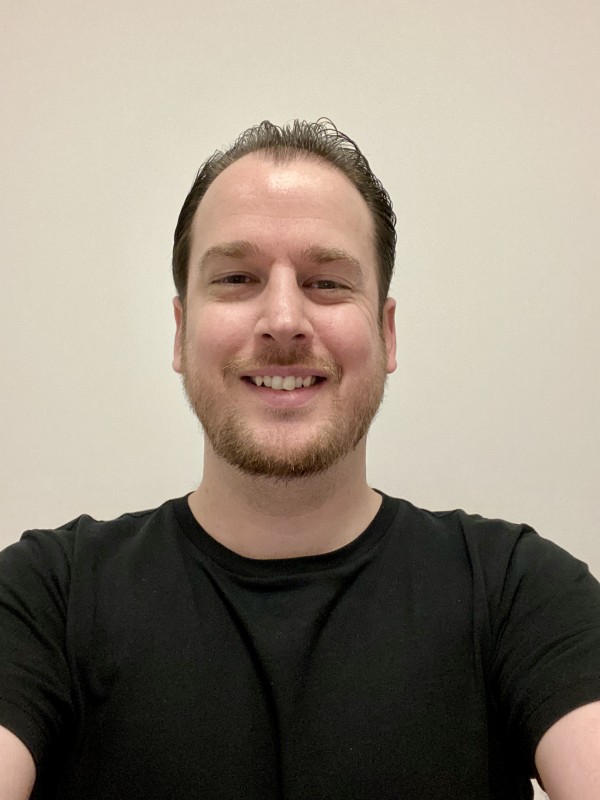
Shane White
Student - Translation and Interpreting MA


Anna Pakes
Student - Translation MA
UK qualifications
If you are a native English speaker, we require a minimum of a 2:2 UK honours degree in one of the languages listed below or in a related subject taught in one of these languages.
Native speakers of a relevant language (from the list below) require a degree in English or a related subject. Alternative subjects will be considered by the Faculty on a case-by-case basis. Relevant work experience to be considered by the Faculty on a case-by-case basis.
The languages available in the programme (subject to demand) are:
- Arabic
- Chinese (Mandarin)
- French
- German
- Greek
- Italian
- Korean
- Norwegian
- Polish
- Portuguese
- Romanian
- Russian
- Spanish
- Swedish
- Turkish.
Other languages may be available upon request.
English language requirements
IELTS Academic: 6.5 overall with 6.5 in writing and speaking and 6.0 in each other element.
Alternatively, if you have successfully been awarded the Certificate of Excellence offered by our partner, KL Communications, and had an IELTS of 6.0 overall with 6.0 in each category before you took the course for the Certificate of Excellence, and the IELTS will still be valid for the start of the MA, then you will not need to take another IELTS.
These are the English language qualifications and levels that we can accept.
If you do not currently meet the level required for your programme, we offer intensive pre-sessional English language courses, designed to take you to the level of English ability and skill required for your studies here.
Selection process
Suitable applicants will be invited to participate in an interview via Skype or Zoom. Alternatively, if you are interested in joining the Chinese group and have successfully been awarded the Certificate of Excellence offered by our partner, KL Communications, you will not be required to undertake an interview.
Recognition of prior learning
We recognise that many students enter their course with valuable knowledge and skills developed through a range of ways.
If this applies to you, the recognition of prior learning process may mean you can join a course without the formal entry requirements, or at a point appropriate to your previous learning and experience.
There are restrictions for some courses and fees may be payable for certain claims. Please contact the Admissions team with any queries.
Scholarships and bursaries
Discover what scholarships and bursaries are available to support your studies.
Fees per year
Explore UKCISA’s website for more information if you are unsure whether you are a UK or overseas student. View the list of fees for all postgraduate courses.
September 2026 - Full-time - 1 year
- UK
- £11,300
- Overseas
- £22,700
September 2026 - Part-time - 2 years
- UK
- £5,700
- Overseas
- £11,400
- These fees apply to the academic year 2026-27 only. Fees are reviewed annually, and tuition fees may increase for courses running over more than one year.
Payment schedule
- Students with Tuition Fee Loan: the Student Loans Company pay fees in line with their schedule (students on an unstructured self-paced part-time course are not eligible for a Tuition Fee Loan).
- Students without a Tuition Fee Loan: pay their fees either in full at the beginning of the programme or in two instalments as follows:
- 50% payable 10 days after the invoice date (expected to be October/November of each academic year)
- 50% in January of the same academic year.
- Students on part-time programmes where fees are paid on a modular basis: cannot pay fees by instalment.
- Sponsored students: must provide us with valid sponsorship information that covers the period of study.
The exact date(s) will be on invoices.
Funding
You may be able to borrow money to help pay your tuition fees and support you with your living costs. Find out more about postgraduate student finance.
Apply online
To apply online first select the course you'd like to apply for then log in.
Select your course
Choose the course option you wish to apply for.
Sign in
Create an account and sign into our application portal.
Please note that we may have to close applications before the stated deadline if we receive a high volume of suitable applications. We advise you to submit your application as soon as it is ready.
ApplyPlease note that we may have to close applications before the stated deadline if we receive a high volume of suitable applications. We advise you to submit your application as soon as it is ready.
ApplyAdmissions information
Once you apply, you can expect to hear back from us within 14 days. This might be with a decision on your application or with a request for further information.
Our code of practice for postgraduate taught admissions explains how the Admissions team considers applications and admits students. Read our postgraduate applicant guidance for more information on applying.
About the University of Surrey
Need more information?
Contact our Admissions team or talk to a current University of Surrey student online.
Terms and conditions
When you accept an offer to study at the University of Surrey, you are agreeing to follow our policies and procedures, student regulations, and terms and conditions.
We provide these terms and conditions at offer stage and are shown again at registration. You will be asked to accept these terms and conditions when you accept the offer made to you.
View our generic registration terms and conditions (PDF) for the 2025/26 academic year, as a guide on what to expect.
Disclaimer
This online prospectus has been published in advance of the academic year to which it applies.
Whilst we have done everything possible to ensure this information is accurate, some changes may happen between publishing and the start of the course.
It is important to check this website for any updates before you apply for a course with us. Read our full disclaimer.
